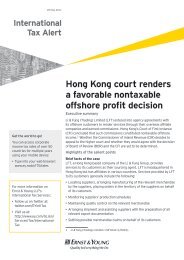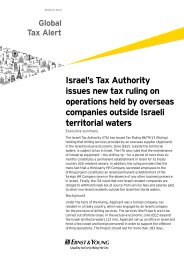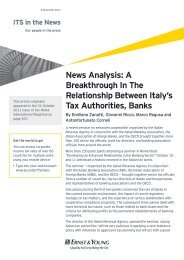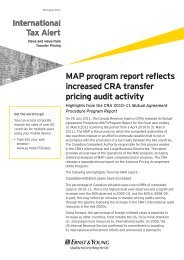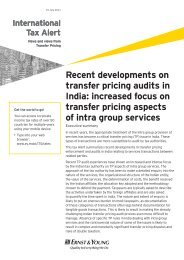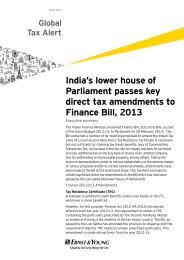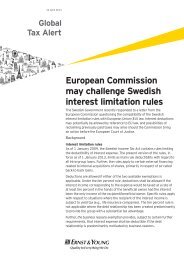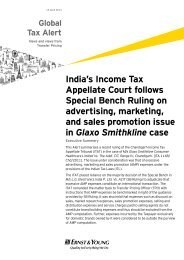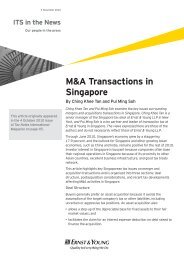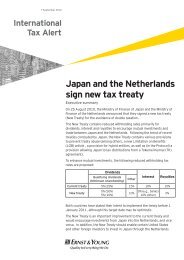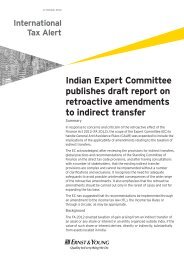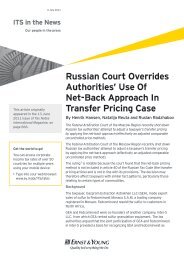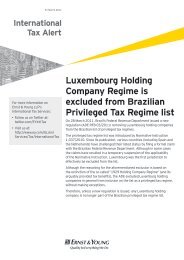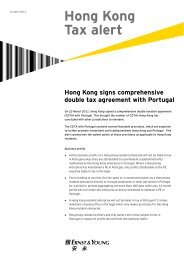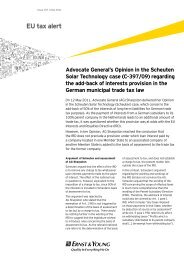(GST) compliance obligations (pdf, 5.62 MB) - Ernst & Young T ...
(GST) compliance obligations (pdf, 5.62 MB) - Ernst & Young T ...
(GST) compliance obligations (pdf, 5.62 MB) - Ernst & Young T ...
You also want an ePaper? Increase the reach of your titles
YUMPU automatically turns print PDFs into web optimized ePapers that Google loves.
How could<br />
the burden be<br />
reduced?<br />
EU Commission view: looking for a win-win situation<br />
Stephen Bill, Advisor to the Director General for Taxation<br />
in the European Commission, talking at the <strong>Ernst</strong> & <strong>Young</strong><br />
2010 Indirect Tax Symposium in Budapest, outlined<br />
ways that governments and honest taxpayers may work<br />
together to reduce the VAT <strong>compliance</strong> burden:<br />
“Organized fraud has become a particular problem within<br />
the EU largely as a result of the system for dealing with<br />
intra-Community supplies of goods between businesses<br />
(B2B). As a result, we have embarked on a short-term<br />
anti-fraud policy within the EU which has, unfortunately,<br />
resulted in increased <strong>compliance</strong> costs for honest traders<br />
(for example, by requiring more frequent reporting of<br />
intra-community supplies). Increasing the <strong>compliance</strong><br />
burden is never a good thing and it is particularly<br />
regrettable at a time when we are seeking to make tax<br />
systems more ‘growth friendly.’ The major imperative for<br />
tax<br />
policy- makers is now therefore the search for a ‘win-win’<br />
situation in which administrative burdens and <strong>compliance</strong><br />
costs can be reduced while at the same time safeguarding<br />
tax revenues.”<br />
“I think there are a number of potential avenues to explore<br />
here. First is creating tax partnerships. Our discussions<br />
with business have shown recognition of the need to<br />
improve communication between taxpayers and tax<br />
administrations and the need to establish a relationship<br />
of trust which could lead to reduced <strong>compliance</strong> costs for<br />
participating traders. One obstacle, however, could be the<br />
principle of equal treatment of taxpayers (laid down in the<br />
constitution of some Member States).”<br />
“An increased use of new technology could also help.<br />
Increased e-invoicing, for example, could in turn lead to<br />
increased use of less intrusive e-audits. The generalized<br />
use of electronic registration and tax return filing also<br />
could reduce <strong>compliance</strong> costs for traders operating in<br />
VAT and <strong>GST</strong>: multiple burdens for multinational companies<br />
more than one Member State. In my opinion, it will be<br />
essential to ensure that tax collection and administration<br />
uses modern technology to the utmost to reduce<br />
<strong>compliance</strong> costs as much as possible, particularly for<br />
cross-border activities since the internal market will be<br />
a cornerstone for stimulating growth in Europe. I firmly<br />
believe that we should develop the concept of the<br />
one-stop-shop so that it could be used for all<br />
intra-community supplies. It could even in the longer term<br />
be used as a mechanism to tax all B2B supplies of goods.”<br />
“There are also some ideas circulating about the possibility<br />
of using financial intermediaries (banks and credit card<br />
companies) as trusted third parties to collect and remit<br />
VAT paid on transactions between taxable persons.”<br />
“Following the adoption of the VAT package and the<br />
completion of the work on the short-term anti-fraud<br />
package of measures, we are now at a watershed in the<br />
EU. We now need to identify what common VAT system<br />
we want in the 21st century and, in particular, how we can<br />
obtain the elusive ‘win-win’ in Europe.”<br />
“This process started already in the EU with the 2008 VAT<br />
Fraud Communication which initiated reflections on the<br />
use of new technologies and the relationship between<br />
taxpayers and tax administrations. As a follow-up to this, a<br />
conference was held in Amsterdam with stakeholders, and<br />
the Commission has initiated a study on ‘simplifying VAT<br />
collection through new technologies.’ The idea will then be<br />
to launch a wide-ranging consultation — kicked off with a<br />
Green Paper identifying problems and suggesting solutions<br />
before finalizing a new strategy in 2011. The new strategy<br />
will build on the four pillars of the existing VAT strategy<br />
(launched in 2000): simplification, modernization, more<br />
uniform application and closer administrative<br />
co-operation.”<br />
30



